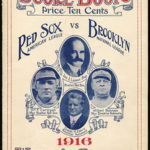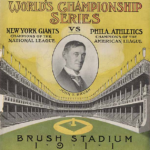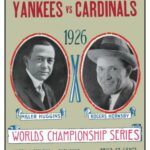History of the World Series – 1972
The last edition of the Kansas City A’s, the 1967 team, was a typically overmatched aggregation and finished with 99 losses. But a check of that club’s roster shows not a ragtag collection of over-the-hill athletes, but a valuable collection of promising Athletics. Jim (Catfish) Hunter was 21 and a 13-game winner for the A’s in ’67. John (Blue Moon) Odom was 22 and a promising righthander. Bert Campaneris, 25, led the AL in stolen bases for the third straight season. Joe Rudi was a player of exciting potential, having won the starting left-field job in spring training at 20 (although he wound up back in the miners later in ’67). Third-base prospect Sal Bando, 23, got into 47 games for Kansas City. And then there was that wet-behind-the-ears slugger who spent most of the season at Birmingham. The kid hit only one homer and batted just .178 for the A’s in 35 games, but you had to like the way he swung at the ball. Name: Reggie Jackson. Age: 21.
Potential doesn’t always translate into success, of course, so no one really knew what would become of the young hotshots A’s owner Charlie Finley had assembled. Sure enough, this talent did come of age after the A’s left Kansas City for Oakland.
In their maiden season in California, the A’s achieved their first winning record since their Philadelphia days of 1952. By the next year, 1969, they were second-place finishers in the AL West and Jackson had emerged as a 47-homer man. Come 1971, the A’s were West Division champions and winners of 101 regular-season games.
Now, in 1972, the A’s were American League titleists after edging the Detroit Tigers, three games to two, in the Championship Series, and were ready to take on the Cincinnati Reds in the World Series.
Manager Dick Williams’ A’s, never known as an uptight bunch, blew into Cincinnati for the first two games of the Series and exhibited few of the jitters usually associated with a sudden thrust into the spotlight. Gene Tenace, a utility player who hit only five home runs in the regular season, was the least flustered. He blasted homers in his first two Series at-bats (a record accomplishment), driving in all of Oakland’s runs, as the A’s copped the Series opener, 3-2. Having lost Jackson in the final game of the AL playoffs because of a hamstring injury, the A’s were looking for muscle and got it from an unexpected source.
Rudi foiled the Reds in Game 2, belting a bases-empty home run in the third inning and making a spectacular catch in the ninth. With one Cincinnati player on base and Oakland ahead, 2-0, in the final inning, Rudi raced to the left-field fence and made a leaping, backhanded catch of Denis Menke’s smash. Hunter, getting last-out relief from Rollie Fingers after pinch-hitter Hal McRae singled home a Reds run, was a 2-1 winner.
Jack Billingham (eight innings-plus) and Clay Carroll combined to shut out Oakland, 1-0, in Game 3 at the Oakland-Alameda County Coliseum, but the A’s dealt Cincinnati a stinging loss in the fourth contest. Down 2-1 with one out in the last of the ninth, Williams’ crew laced four consecutive singles for two runs and a 3-2 victory. Pinch-hitter Gonzalo Marquez got the first hit, catcher Tenace the second and pinch batter Don Mincher delivered the third, which tied the score. Then Angel Mangual, yet another pinch-hitter, ended the game by getting the ball through the right side of a drawn-in infield.
Pete Rose sparked Cincinnati in Game 5, leading off the contest with a home run and then breaking a 4-4 tie in the ninth with a single. Menke also homered for the Reds in their must-win 5-4 triumph, while Tenace cracked a three-run shot for Oakland. The game concluded on a dramatic note in the last of the ninth when, with pinch-runner Odom on third base and Dave Duncan on first, Campaneris lifted a foul pop behind first base. Joe Morgan, ranging over from his second-base position, made the catch and, after stumbling, threw out a gambling Odom at the plate as Blue Moon tried to score after tagging up.
After five consecutive one-run games, the Series was due for a blowout. And the Reds, getting two-run singles from Bobby Tolan and Cesar Geronimo in a five-run seventh, did the honors with an 8-1 romp in Game 6.
Tenace, who had started this Series with such a bang at Riverfront Stadium, wound it up in fine style at the same site. He rapped a run-scoring single in the first inning and an RBI double in the sixth, sparking Oakland to a 3-2 triumph in which Williams, doing whatever was necessary to nail down the World Series crown, used 21-game winner Hunter, 19-victory lefthander Ken Holtzman and Fingers in relief of Odom.
The victory gave the A’s their first Series championship since 1930, when the team represented Philadelphia. The ’72 title, then, was pretty heady stuff for a club that just five years earlier didn’t quite know where it was headed.





